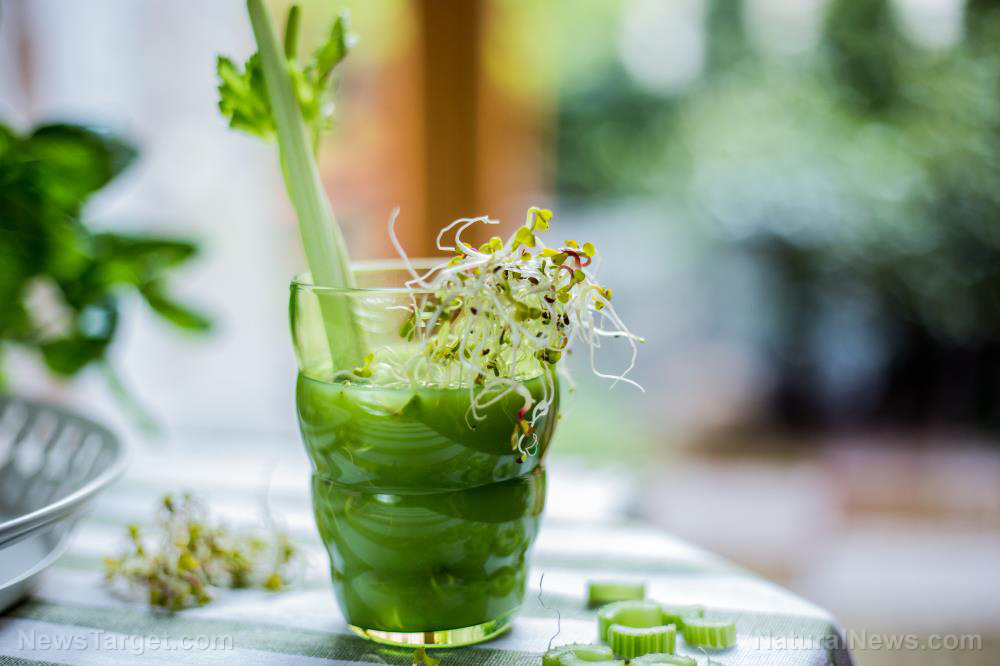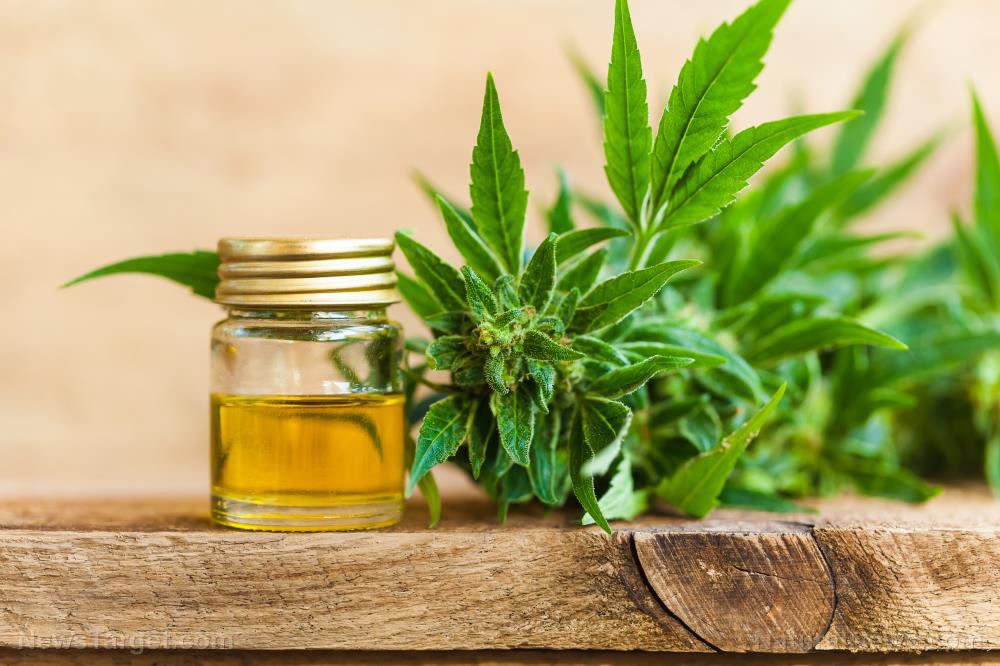
According to animal and human studies, eating celery can help lower your blood pressure naturally and also fight different types of cancer.
A favorite among weight watchers, celery has a very low calorie count, with two stalks containing only 15 calories. This is not surprising as celery is made up of almost 95 percent water. Despite this, celery is a great source of essential nutrients, such as dietary fiber, vitamins A, B5, B9, C and K, calcium, iron, molybdenum, potassium and magnesium. This, along with its high water content, makes celery the perfect hydrating food to snack on during hot summer months.
Research shows that celery also contains plenty of beneficial phytonutrients that are behind its anti-inflammatory, antioxidant, antifungal, antibacterial, diuretic, antihypertensive, cholesterol-lowering and anticancer properties. Some of the active components of celery that have been highlighted by studies are apigenin, luteolin, apiuman, chrysoeriol, coumarin, phthalides, polyacetylenes, perillyl alcohol and d-limonene. These compounds can be found in the leaves, seeds and heart of celery.
Celery found to lower blood pressure and blood cholesterol
A 2015 study published in the Avicenna Journal of Phytomedicine looked at the effect of celery leaf extracts on the blood pressure, heart rate and lipid profile of an animal model of hypertension (high blood pressure). The extracts were obtained from fresh celery leaves using 70 percent ethanol as solvent. (Related: Celery is a crunchy superfood that reverses metabolic syndrome.)
The researchers divided the hypertensive rats into five groups: The control group were given plain drinking water; the second group received 200 milligrams (mg)/kilogram (kg) celery leaf extract; the third group received only 10 percent fructose in their drinking water; the fourth group received 10 percent fructose and 100 mg/kg celery leaf extract; and the fifth group received 10 percent fructose and 200 mg/kg celery leaf extract.
At the end of each week for seven weeks, the researchers measured the animals' blood pressure and heart rate and analyzed blood samples to check their lipid profiles. At the end of the study, the researchers found that the systolic blood pressure of rats given fructose significantly increased compared to the control group. However, treatment with 100 mg and 200 mg/kg celery leaf extract significantly decreased blood pressure in the fructose groups.
Similarly, fructose significantly increased blood cholesterol, blood triglyceride, low-density lipoprotein (LDL) and very low-density lipoprotein (VLDL) levels in the groups that received the sugar. But treatment with celery leaf extract reversed this effect and significantly improved the lipid profiles of the hypertensive rats. On the other hand, the researchers noted that the extract had no effect on the heart rate and high-density lipoprotein (HDL) of any of the groups.
Because of these findings, the researchers concluded that "celery leaf extract, with its blood pressure and lipid-lowering effects, can be considered an antihypertensive agent [for the] chronic treatment of elevated SBP [systolic blood pressure]." (Related: The powerful antihyperlipidemic effect of celery seeds.)
In humans, celery has also been reported to have a similar effect. A recent study published in the Journal of Chiropractic Medicine reported the case of an elderly hypertensive patient who experienced heart benefits after including celery juice in his daily diet. The 74-year-old patient, whose blood pressure measured 150/80 mmHg and also suffered from neck pain, initially tried various medications to treat his condition but complained that they gave him chest discomfort, which prompted his switch to a natural intervention.
Together with chiropractic intervention for his neck pain, the patient drank celery juice every day for six months. No exercise or other lifestyle changes were included in the intervention. At the end of his care, the elderly patient's blood pressure significantly decreased and was reported to be 118/82 mmHg, suggesting that drinking celery juice regularly can effectively lower high blood pressure.
Aside from powerful antioxidants, experts attribute the antihypertensive properties of celery to compounds called phthalides. Research shows that a celery phthalide called 3-n-butylphthalide (NBP) can relax the tissue lining the walls of your arteries to improve blood flow and naturally reduce blood pressure. The apigenin in celery has also been found to lower blood pressure by acting as a diuretic (increases urine production) and vasodilator (widens blood vessels).
Celery also boasts potent anticancer properties
The anticancer activities of celery extracts are also well-documented. For instance, a recent study published in the journal Bioinformation reported that extracts from different parts the vegetable, such as its leaves and seeds, exhibited cytotoxic (damages or destroys cells) activities against rat liver and human lung cancer cell lines. (Related: Scientists say celery may help prevent and treat cancer.)
In animal studies, celery seed extracts, which contain luteolin, have also been found to inhibit carcinogen-induced liver and stomach cancer. The anticancer properties of luteolin, according to a review published in Heliyon, can be "attributed to its capability to engage with multiple molecular targeted sites and modify various signaling pathways in tumor cells."
Other studies have found that luteolin can induce apoptosis, or programmed cell death, in oral cancer cells; promote cell cycle arrest in colon cancer cells; inhibit IGF-1 receptor signaling in prostate cancer cells (thus preventing cancer growth and metastasis); and slow the spread of breast, colorectal, lung, prostate, liver, skin, pancreatic, oral and stomach cancers.
Meanwhile, the apigenin in celery leaves has been shown to induce apoptosis in human skin, thyroid, gastric, liver, colon, cervical and prostate cancer cells, as well as to prevent the migration and invasion of ovarian cancer cells. Animal studies also reveal that the perillyl alcohol in celery seeds can suppress the growth and metastasis of both estrogen receptor (ER)+ and ER- human breast cancer cells. (Related: Celery is an underappreciated vegetable: This nutritional superhero targets cancer cells at a molecular level.)
Celery is a nutritious superfood that can do wonders for your health when incorporated into a well-balanced diet. Bursting with powerful compounds that possess remarkable properties, celery can help keep your heart healthy and lower your risk of different types of cancer.
Discover more superfoods like celery at FoodIsMedicine.com.
Watch the following video to learn more about celery – a powerful healing plant.
This video is from the Natural News channel on Brighteon.com.
More related stories:
Celery is an ancient healing food.
Compounds found in celery make it a powerful healing plant.
How to grow pesticide-free organic celery.
5 Health benefits of fiber-rich celery.
The powerful antihyperlipidemic effect of celery seeds.
Sources include:
Please contact us for more information.






















